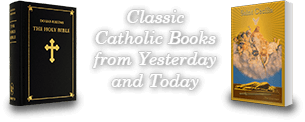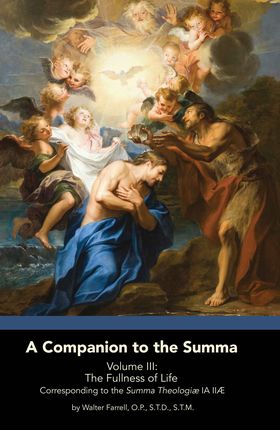Categories
Information
Fr. Walter Farrell, O. P. - ebook (epub, pdf, mobi) 464 pages
Volume Three
Originally, Fr. Farrell published Vol. Two and Vol. Three before Volumes One and Four.
Chesterton, in his Saint Thomas Aquinas, has explained both my order of publication and the title of this volume. “He (Thomas) did, with a most solid and colossal conviction, believe in Life; and in something like what Stevenson called the great theorem of the livableness of life.… The medievals had put many restrictions, and some excessive restrictions, upon the universal human hunger and even fury for life.... Never until modern thought began, did they really have to fight with men who desired to die. That horror had threatened them in Asiatic Albigensianism, but it never became normal to them—until now.” The whole second part of the Summa, covered by Vols. two and three, deals precisely with the living of human life, the invaluable meaning of that life, and the secrets of the fullest success in the living of it. This part was published first, had to be published first, because of that unholy, perverted eagerness of modern men to throw away their lives and to discard their humanity. This is St. Thomas’ superb defense of the humanity of man. The remaining volumes of this work plumb the depths and scale the heights of the unutterable truths, the mysterious beginnings and glorious goals, that interpenetrate that human life with something of divinity, the truths that are the ultimate explanations of its incredible significance.
This is not a book about the Summa, but the Summa itself reduced to popular language; and Thomas is not read in a day or a year, nor can we suffer an introduction to him, shake hands and then dismiss him from our lives. If we make the happy mistake of so much as smiling at him, he moves bag and baggage into our minds, to become an increasingly more delightful intimate as the years move on.
The Author
Father Farrell’s four-part Companion to the Summa has been responsible for much of the renewed interest in Thomism in the United States. It is required reading for many Catholic college students and “unrequired reading” for thousands of other lovers of St. Thomas.
Its author was born in Chicago in 1902. He attended Dominican schools and was ordained in the Dominican order in 1927, then going to the University of Fribourg for his S.T.D. degree. In 1940 he was awarded the seldom given Dominican honor of the Master of Sacred Theology degree. He served as a Navy chaplain during World War II and was then stationed at the Dominican Houses of Studies in Washington, D. C. and River Forest, Illinois until his death in 1951.
A Word About Loreto Publications
All publishing houses have some overarching principles that guide the choice of which books they publish and promote (unless they be primarily interested in monetary gain, in which case they are of no account) and according to which they base their operations and choices.
Loreto’s foundation is based upon a specific set of Catholic principles and a school of thought that developed around a religious order founded in 1949 in Cambridge Massachusetts, the Slaves of the Immaculate Heart of Mary. At the heart of their spirituality lies two essential pursuits, the pursuit of wisdom as described by their philosopher Br. Francis Maluf, M.I.C.M. —“Wisdom is the most perfect knowledge of the most important truths in the right order of emphasis, accompanied by a total, permanent disposition to live accordingly.”—and a fervent desire to train up an army of apostles to convert our beloved nation to the Catholic religion.
The spiritual and intellectual life of these ardent Slaves developed by being steeped in the works of people such as Cornelius aLapidé, Dom Gueranger, St. John Eudes, St. Louis Marie deMontfort, Bl. Dom Marmion, St. Maximilian Kolbe, St. Alphonsus Maria deLiguori, and the Fathers and Doctors of the Church, especially St. John Chrysostom, St. Augustine, and St. Thomas Aquinas. Of course, their attachment and devotion to Our Lady of Fatima and the ancient and immemorial Roman liturgy is legendary.
For articles about the Summa and St. Thomas Aquinas, click here!



